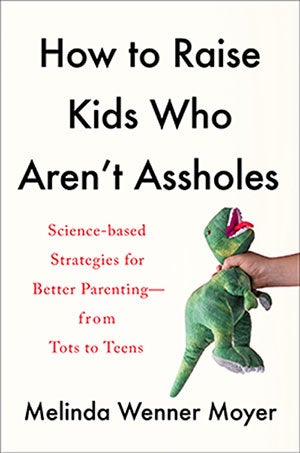There is no shortage of parenting advice in books and on the Internet, much of it conflicting—for instance, “Do sleep train your baby” versus “Don't, under any circumstances, sleep train your baby.” But the vast majority of this guidance is based on anecdotal experience and personal belief; very little of it relies on evidence, found Scientific American contributing science writer Melinda Wenner Moyer, a parent of two. She set out to discover what science has to say about one of the most profound questions a parent can ask: “How do I raise my children to help make the world a better place?”
In other words, “How can I make sure my kids don't turn into selfish boors?” In her book How to Raise Kids Who Aren't Assholes: Science-based Strategies for Better Parenting—from Tots to Teens (G. P. Putnam's Sons, 2021), Moyer probes the research on how to encourage kids to be generous, honest, helpful and kind. She reviews studies on how to instill egalitarian beliefs and make sure kids know how to stand up against racism and sexism. And she talks to scientists about perennial parental struggles such as sibling rivalry, teaching safe sex and moderating screen time. Scientific American spoke to Moyer about science-based strategies for raising good citizens.
An edited transcript of the interview follows.
On supporting science journalism
If you're enjoying this article, consider supporting our award-winning journalism by subscribing. By purchasing a subscription you are helping to ensure the future of impactful stories about the discoveries and ideas shaping our world today.
I love that this book addresses so many questions and insecurities I have as a parent. Why did you decide to write it?
I want my kids to be compassionate, kind, generous antiracists and antisexists. And I thought, “I can learn about how to raise my kids in these ways and to instill values based on science rather than just relying on my instincts.” I was surprised by just how much research there was on these questions and how little of it was being covered.
There is already so much pressure on parents these days. I don't want to tell other parents what to do. But if I could write a book that gives parents tools that could change the world for the better, that feels important. I want this book to make parents' lives easier, to give them answers to questions they might have had and to give them the science and tools they've been looking for. I don't want to add to their burdens or add to the judgment that parents are under right now.
Were there any cases where you found the science went against what you previously thought and surprised you?
One of the core questions I had was, “How do I raise my kids to be generous and kind?” A lot of what we hear is about the importance of teaching giving and generosity. But the research I kept coming across stemmed from how we talk about feelings. That's surprising—why would that have anything to do with how generous children would become? It became clear that helping our kids understand their feelings gives them the capacity to understand others' feelings, and that helps them make decisions to help their friends and be more generous toward them. This is part of something called theory of mind—how to understand others' feelings. Research suggests that the more parents talk about their feelings and other peoples', the more kids are likely to be generous and helpful.

Credit: Putnam
What does science tell us about raising kids to be antiracist?
Parents often think if we don't talk about race, our children won't see it, won't develop racism. That is, in fact, the opposite of what happens. Kids see race from a very early age and are very tuned in to social hierarchies. They are like little detectives trying to figure out how social categories work in the world and why. They see that most American presidents have been white and that a lot of the kids at school who have the biggest houses, their parents are white. They think the simplest explanation is that white people are just better or smarter. The research shows we need to correct these misconceptions as children are developing them. We need to talk about it quite a lot, which is really hard for white parents; it's hard for me. Some of these approaches I learned for the book are hard. They take practice and are not instinctual, but the research shows those difficult conversations help even if they're not perfect.
I have a four-year-old daughter, and I don't think she has any idea yet that anyone thinks girls aren't just as good as boys. Is it really helpful to introduce her to the idea of sexism?
I had the same question, and I posed this to the researchers. My daughter and I were reading Good Night Stories for Rebel Girls, and every story we read touched on the sexism these women experienced and overcame. I kept thinking it was hitting my daughter over the head with the idea that she'd have to fight sexism. But I found that no, actually, they are already perceiving it often on some level, even if they're not bringing it up. They're seeing the presidents are all men, all these powerful people are all men. They notice. When we do bring it up and talk about it, it helps them work through it. It is counterintuitive.
One of the interesting things you mention in your book is that parents often worry that their child will be bullied and rarely worry that their child will be a bully.
We have this idea that there is a type of kid that is a bully. But it's not just a bad seed who becomes a bully. Anybody can bully. We need to have regular conversations with our kids about this. Some of the research has found that kids who engage in bullying behaviors often don't realize their behavior is hurtful. It comes back to the idea of talking about feelings. Sometimes they aren't intentionally trying to hurt other people—they don't understand the impact of what they're doing.
Another fascinating chapter is about the dangers of pressuring kids for academic success.
That was a chapter that blew me away. I was surprised to find that our well-meaning desires for our kids to succeed and achieve can be so harmful to self-esteem. I was reading the research and thinking, “Am I doing this? Am I turning my child into a monster?” We all just want our kids to do better and better. We're worried about getting our kids into college, and our fears are grounded—it's harder than it used to be. But if we aren't careful, we can actually seed the very problems we're trying to avoid. If kids are constantly questioning themselves because they feel our love is contingent on how well they do and their grades, they're going to have so many issues with self-esteem.
Science is still trying to figure out how much nature and nurture affect personality. Do parents have a lot of room to influence who their kids will turn out to be?
I think genetics certainly play a role, but it's clear that environment and parenting do, too. We might have kids who start in different places with their propensity to be generous or have these other traits, but we can still move them in the right direction through how we parent. I observe that my two children have very different personalities and different inclinations toward generosity and empathy. But as I've learned to parent through the techniques I talk about in the book, I've seen both of them change.
